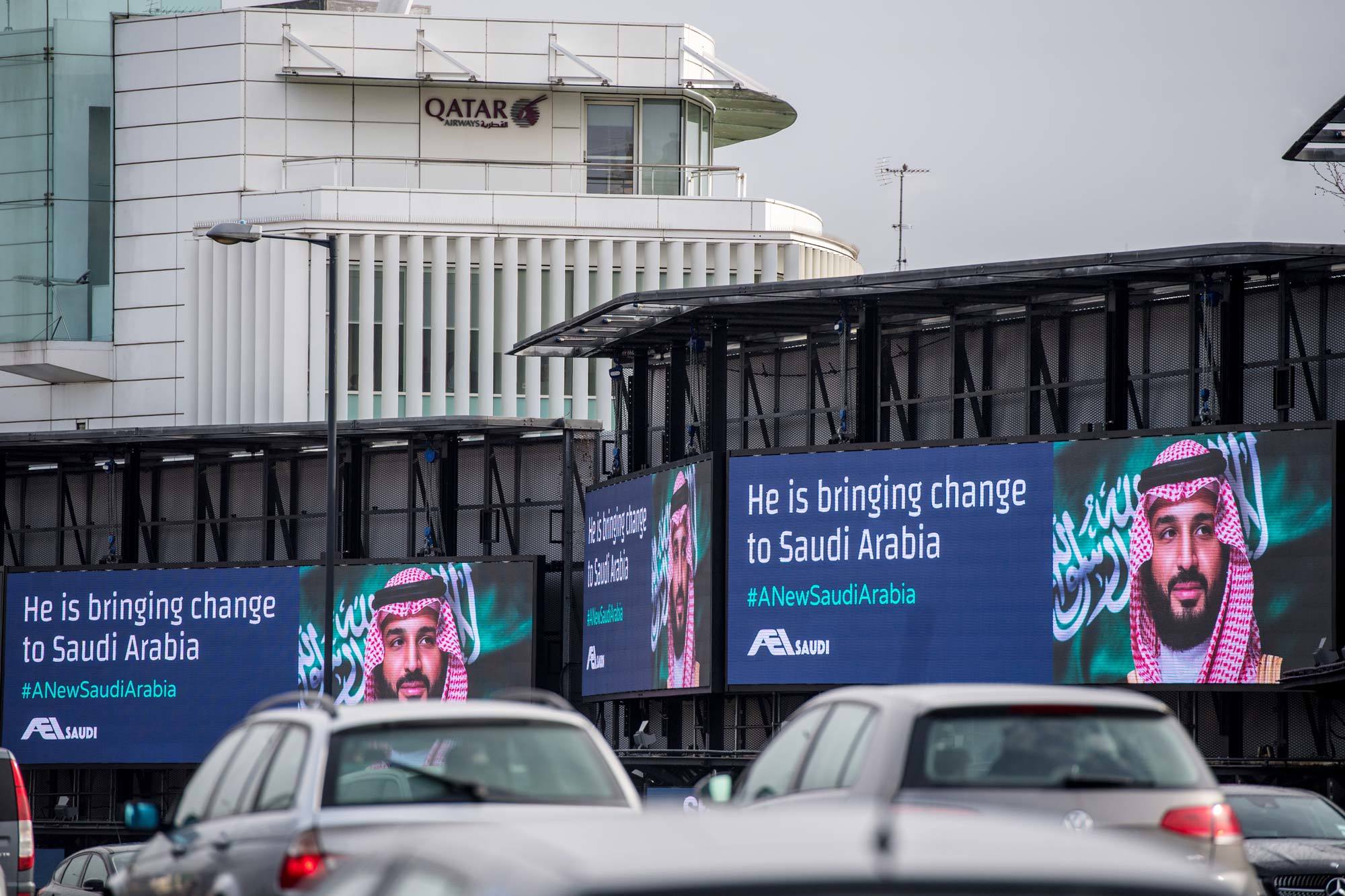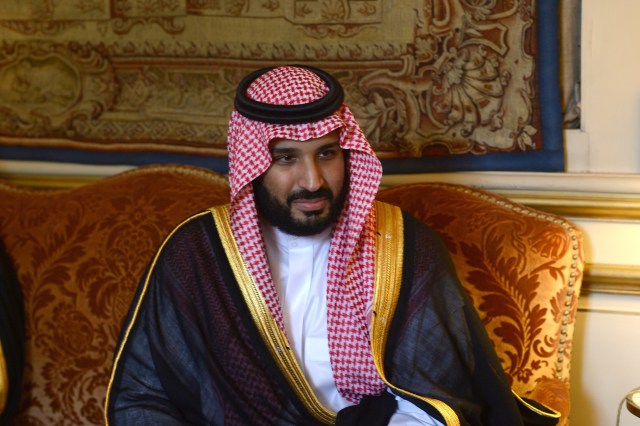CROWN PRINCE MOHAMMED BIN SALMAN HAS DETAINED 11 PRINCES, FOUR SITTING MINISTERS AND DOZENS OF FORMER MINISTERS BY ROYAL DECREE. CREDIT: ABD RABBO AMMAR/ABACA/ABACA/PA IMAGES

Much of the media has been recently diverted by a certain malign foreign presence in Britain – the rich Russians of Londongrad, who have come under the spotlight because of the alleged poisonings in Salisbury. But there has been another presence, one which confirmed the widespread impression that this country is a glorified souk. For last week our global image was being sullied in the interests of presenting an entirely cosmetic view of Saudi Arabia.
Drivers along the M4 and M40 into central London were probably perplexed by large hoardings showing the smiling face of 32-year-old Saudi Crown Prince Mohammed bin Salman.”‘He is bringing change to Saudi Arabia” one proclaimed, while another wit thought up “United Kingdoms”. Some London black cabs were similarly adorned with glad tidings from Riyadh to the people of London, who may confuse the Kingdom with nightly images of emaciated children in Yemen’s rudimentary (bombed) hospitals.
These were merely the finishing touches to a propaganda campaign – the word ‘spin’ is too harmless – which the Saudis and their PR machine have been waging in Britain and the US (where MbS has just landed) since late autumn 2017. It has borne spectacular fruit.
I was told last November that the robed duo of the Saudi foreign minister and the Kingdom’s ambassador had visited at least two national newspapers, touting an exclusive interview with ‘MbS’. Their pages were already routinely filled with comment and analysis that swallows the Saudi-Emirati-Israeli view of the Middle East. In the event, before MbS touched down in London, the Telegraph’s Con Coughlin, a long-time admirer of the Saudi monarchy, scooped everyone with a note-taking session in the Crown Prince’s suburban palace at Irqah.
Since no man or woman in the British street gives a damn about Saudi Arabia, save to condemn its war crimes in Yemen, this visit was nothing but a love-in by the Kingdom’s elites. What’s not to like, after all, in a monarchy based on deference and nepotism, and where horses and hawks are all that pass for cultural interest.
Aspects of a full-blown state visit, like a coach ride down the Mall, were left off the agenda last week; but it felt like one in all but name: lunch with the Queen, dinner with Princes Charles and William, a new strategic partnership announced in No 10, briefings from the heads of the security services, a meeting with the Defence Secretary, and a night at Windsor Castle. One can only imagine what informal gatherings were been arranged in London or now Washington by paid influence peddlers and lobbyists. Think-tanks are especially useful in lending Saudi policy the appearance of ‘academic’ respectability, to anyone naïve enough to imagine they are like universities, were Gulf money not also generously strewn across the transatlantic Academy too.
MbS’s visit to the West bears all the hallmarks of a category error we have seen time and time again. We eagerly identify a ‘reformer’, as Tony Blair did in the case of Bashar al-Assad. Then because we need to prove that our judgment was impeccable, we become apologists for the ‘reforms’, regardless of whether they succeed, or whether they are substance or illusion. There is a ready example to hand, the King Abdullah Economic City in Rabigh, which instead of two million happy inhabitants, has a mere 5,000 and a lot less trade than the Dubai it was supposed to eclipse one day.
The fact that we are needy supplicants not just for arms contracts, but IPOs, and deals in property, services, technology, education and entertainment, ensures that we are more than ready to overlook the fact that the ‘reformer’ is also a reckless agent of chaos.
Fresh from investing $10 billion in Egypt (MbS’s first port of call) the Saudis have already made much of the ‘$100 billion’ of deals they touted in Britain, though many of these were merely memoranda of agreement. The state of Saudi finances does not inspire confidence that many deals will be signed, however eager our ancient public schools are to ‘modernise’ schools in the Kingdom.
For sure, MbS has allowed Saudi women to drive, and would like them to play their part in his Vision 2030 for an economy diversified from chronic dependence on oil. But that should not occlude either the erratic pace of his reforms, where one also has to distinguish fact from fantasy, or the catastrophic regional impact of his reckless decisions as defence supremo.

In his rise to power, MbS has ruthlessly purged potential rivals, starting with his cousin Mohammed bin Nayaf, the long-term Interior Minister, and widely regarded as a genuine friend of the West. He has also taken down the head of the National Guard and replaced the entire military high command, just prior to his first big overseas trip.
Other rivals and a token sprinkling of the big rich totalling 200 men were subject to the notorious ‘sheikh down’ in the Ritz Carlton hotel, where they were forced to disgorge $106 billion of allegedly ill-gotten gains. This popular move was organised by MbS, whose own whimsical purchases of a $300 million chateau in France, a $450 million Leonardo, and a $400 million super yacht were presumably regarded as the due perks of this latter-day Arab Lincoln. Among the 50 men who have literally disappeared, are prominent reformers, including the former economy minister, Adel Fakeih, and the Amr Dabbagh, ex-head of the Kingdom’s investment authority.
The conversion of the Ritz Carlton into a jail used to extort money struck some of the international investors who had just been courted there as strange. They had been subjected to hours of Saudi boosterism, including glossy promo videos advertising the $500 billion Neom ‘insta-city’ which MbS plans to build on the Red Sea coast. It is projected to be the size of 37 Singapores, with robots making up half the population. If you cannot shift traditional Saudi society, just build yourself a new version seems to be the message from what amounts to a high tech sandcastle.
The economic reality is that Saudi Arabia is burning through its sovereign reserves, not least by waging a war in Yemen which costs $5 billion a month and that has been ongoing for two years. It is borrowing more and more money through bond sales, while delaying the part floatation of Saudi Aramco because it cannot lift the lid on either the size of its reserves or how its profits are used to subsidize princes and any projects that the stunted Saudi private sector cannot manage. That is why Chinese or Russian consortia are more likely to be involved in a private sale than an IPO in London or New York.
Each attempt to slash the bulky public sector and cradle to grave welfare handouts has been reversed as covert analysis of social media picks up rumblings of discontent. Nor in an autocracy have any of these reforms – cooked up by MbS’s inner team of technocrats – been subjected to discussion or scrutiny. On the contrary, any signs of dissent are brutally repressed, up to and including publicly executing people who were teenagers when they attempted to protest.
Then there is the fiction that Saudi Arabia is a reliable strategic partner. I have seen no evidence, contrary to bald assertions by Tony Blair, that Saudi Arabia has made a significant contribution to stemming the Islamist terrorist threat to the UK, a threat that has everything to do with the money the Kingdom has poured into the universal propagation of Wahhabism. Just because MbS sys he is cracking down on extreme interpretations of Islam, which he absurdly blamed on Iran’s Shia clerics, does not mean that he is actually restraining the Saudi clergy or the Ministry of Islamic Affairs which propagates Wahhabism.
The Saudi militia occupied Bahrain in March 2011 to repress its restive Shia majority, and latterly, its economic strangulation of Qatar, whose sole effect has been to rupture the regional Gulf Cooperation Council, propelling Kuwait and Oman towards Iran. A maniacal obsession with the malignity of Iran also explains why MbS effectively held the prime minister of Lebanon hostage. A Saudi citizen, Rafaik Hariri had not performed to MbS’s liking in curbing the legitimate political influence in Lebanon of Hizbollah’s political wing. Fortunately Hariri had President Macron ready to ride to his rescue.
This has presented Iran with a low cost opportunity to menace the Saudis from another direction – Tehran’s relations with the Houthi were tangential at best before – while creating spaces in which both Al Qaeda and ISIS have flourished. Worse, whatever the British and American governments may claim, the air war has been indiscriminate, with more than 10,000 civilians killed, while the Saudis have been using Boer War-style tactics to starve the Yemeni people into submission.
As usual, with their usual enthusiasm, the British have gone all-in to support a man who is far from secure as Saudi ruler, and whose impact on the region has been deleterious. But a bigger test is coming. So far, Britain has sought to maintain the 2015 nuclear agreement with Iran, despite Donald Trump’s best efforts to unravel it to suit the interests of his Israeli friend Netanyahu. At some point, the UK will have to decide whether its needy relationship with MbS (and Trump) outweighs the benefits of a balance of power between Iran and Saudi Arabia in the Gulf.










Join the discussion
Join like minded readers that support our journalism by becoming a paid subscriber
To join the discussion in the comments, become a paid subscriber.
Join like minded readers that support our journalism, read unlimited articles and enjoy other subscriber-only benefits.
Subscribe